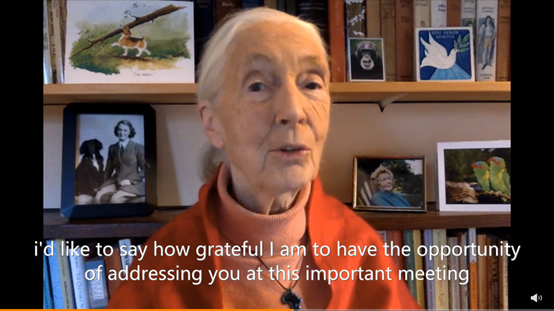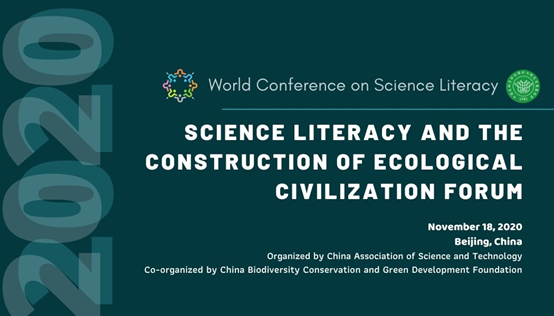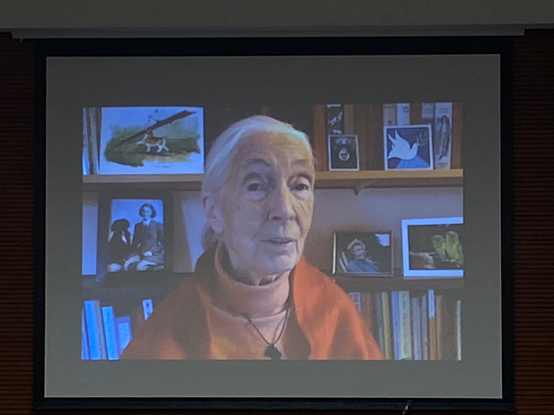The World Conference on Science Literacy (WCSL) is an international conference initiated and hosted by China Association of Science and Technology (CAST). Themed as “Improve Public Science Literacy, Promote Global Anti-pandemic Effort”, the 2020 World Conference on Science Literacy aims to share ideas, experience and results of science-based anti-pandemic, discuss countermeasures and plans to respond to public health crises, further improve science literacy, promote the construction of international cooperation mechanisms, and improve the capacity of the global science and technology communities in coping with the crisis and challenges of major pandemics. It is dedicated to improving the ability of the global scientific and technological community to jointly respond to major epidemics and other crises and challenges and promote the global improvement of scientific quality in the post-pandemic era.
The "Science Literacy and the Construction of Ecological Civilization" thematic forum organized by the CAST and co-organized by China Biodiversity Conservation and Green Development Foundation (CBCGDF) was held on November 18, 2020 in Beijing.
When the forum started, Dr. Jane Goodall, the renowned English primatologist and anthropologist, the world's foremost expert on chimpanzees, also a UN Messenger of Peace, brought us a thought-provoking remote speech. In particular, the content of Dr. Goodall's speech is organized and shared with readers as follows.
Hello,
First of all, I’d like to say how grateful I am to have the opportunity of addressing you at this important meeting, and I'm talking from the UK.
I’ve been in lockdown or stuck here in the UK since the beginning of the pandemic. I'm actually speaking from the home where I grew up.
And this pandemic has caused immense suffering and disruption of non-normal life all around the world that's caused lots of life, loss of loved ones, loss of jobs, economic chaos, everywhere.
The sad thing is that to a very large extent, we brought it on ourselves by our absolute disrespect of the natural world and animals. So as we destroy habitats, and as we penetrate deeper and deeper into the natural world: Building roads and dams, new shopping malls, housing, and so on, and with our intensive agriculture, which again is destroying wildlife habitats, pushing many animals in the closer contact with people in their desperate effort to find enough food to stay alive, and trafficking them to sell in wildlife markets in Asia, bushmeat markets in Africa.
There is the growing international trade in exotic animals, and in all of these situations, we are providing environments which make it easy for a pathogen to jump form an animal to a person. I forgot the factory farms, the commercial animal farming, where billions of animals worldwide are crammed into on hygienic and cramped conditions. So, when a pathogen jumps to a human, it may create a new zoonotic disease such as COVID-19. In fact, some 75% of all newly emerged human diseases are zoonotic diseases. They have appeared in all parts of the world from our treatment of animals.
As I spent many years studying chimpanzees in Africa, our closest living relatives, as does like us in so many ways, including biologically. And when I first went to start this study in 1960, I haven’t been to university. My mentor told me I had to get a PhD. There was no time for a bachelor’s. So, I’ve been with the chimpanzees two year. When I arrived in Cambridge, very nervous to be told by the professors. I done study wrong, I shouldn’t have given the chimpanzees names, but rather numbers that was more scientific. And I couldn’t talk about them having personalities.
Mind is capable of solving problems, and certainly not emotions like happiness, sadness, fear, despair. In fact, some people even thought they couldn’t feel pain. Fortunately, I had a wonderful teacher as a child, my dog. And I knew that in this respect, these professors were wrong. Because of the detailed observation from our research at Gombe, and the film that was taken by my first husband Hugo van Lawick, science had to start thinking out of this reduction estate box. And except that we are not the only beings on the planet with personalities, minds, and above all emotions, this means we now have crossed what was seen as an unbridgeable chasm, dividing us from the rest of the animal kingdom.
When I talk about animals who are being treated with this lack of respect, we have to remember that each one of these animals, whether it’s in a wildlife market, a factory farm, they all have their own personalities. They have their own lives, they can feel depressed, and they can certainly feel fear and pain that makes it even worse.
So, we need a lot more education so that people understand animals are sentiment being, as we emerge from this pandemic, then we are confronted with the ongoing and far worse threat to our future. That is climate change, the climate crisis. It’s not something that might happen, it’s happening now with the patterns changing all around the world.
I used to travel around the world 300 days a year. Everywhere I went, there were people saying weather patterns had changed. I’ve seen the results of the more frequent, really bad hurricanes and typhoons. I have seen the ice melting in the arctic. I have seen people who had to leave their homes because of rising sea levels. And the terrible fires that have been raging in parts of the world due to the droughts, the dry seasons getting worse. This too we have brought upon ourselves by our disrespect of the natural world.
It doesn’t make sense to think that we can have unlimited global economic development on a planet with infinite natural resource and growing populations of humans and their livestock. Already in some places, we’ve used up nature’s finite natural resources faster than nature can replenish them. And it’s only going to get worse.
So, it’s desperately important that we get together around the world and try to create a different relationship, a more sustainable relationship with nature, and a more sustainable greener economy. To do this, we have to eliminate poverty, because when you are really poor, you are going to do what it takes to stay alive. Whether it’s destroying the environment, whether it’s hunting, killing, breeding animals, you have got to stay alive. In cities, you are going to buy the cheapest junk food, you can’t afford to say, did it harm the environment in its production? Was it cruel to animals? And so forth.
And we have got to reduce our unsustainable lifestyle of so many millions of us on the planet today. This is an estimated 78 plus billion was the latest I heard human beings on the planet now. It’s predicted to be close to 10 billion in 2050. So, something has to change. And business as usual isn’t really an option if we care about future generations. So, is there hope? Well, as least this pandemic, and as people come to grip of the climate change, we have to create change.
So many people that I speak to talk about this. What are the reasons the hope does hope? But I don’t think it’s a very big window of time and it is closing. But first of all, this incredible intellect that we have. Scientists are beginning to come up with new technology that can help us live in a greater harmony with the natural world. And our individual lives are using our intellect to try and make smaller lighter ecological footprints. And then there is the resilience of nature.
Places that we have destroyed can be given another chance. You’ve got so many examples of that. Animals on the brink of extinction can be given another chance.
Then finally those young people waking up, it’s their future. We’ve been harming their future; we’ve been stealing it. Actually, we are still stealing it today. It was because so many young people had lost hope that I began our Roots & Shoots program. Now in countries around the world are growing its many groups. Young people of all ages working on projects that they choose to make the world better for everyone and everything. And so those are my great reasons for hope.
The last thing I would say is that we should remember that every single day we live, we make some impact on the planet, and we can choose what sort of impact we make.
So, once again, thank you for inviting me to say these few words. And I hope that this is a very, very important meaningful and inspirational event. Thank you.



(Photo credit: CBCGDF)
Links for reference:
http://www.cbcgdf.org/English/NewsShow/5012/14201.html
http://www.wcsl.org.cn/detail?id=306&channelId=55
By / Maggie
https://www.paypal.me/CBCGDFChina
http://www.cbcgdf.org/English/ConfirmDonaTion/0.html
